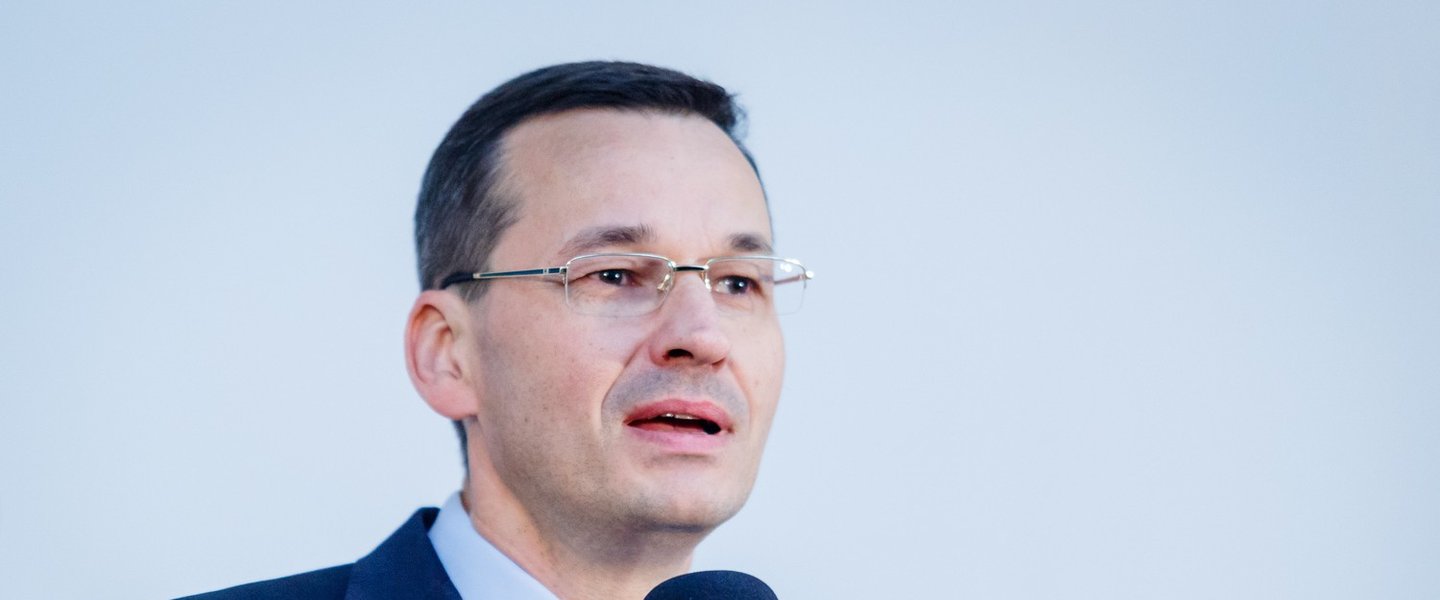Morawiecki: I want to pull the economy out of the pitfall
An interview with Mateusz Morawiecki, Deputy Prime Minister and Minister of Development in the cabinet of Beata Szydlo.
Law and Justice (PiS) has been in power for six months now. How would you evaluate the economic achievements of the government so far?
I believe that we have managed to do a great deal in these six months. We’ve done more than the previous government did in six years. Without doing any damage we’ve been tweaking Poland’s development model, we want to strengthen the construction of the Polish economy, Polish capital.
I am going by the assumption that economic policy is there to first and foremost serve the citizens: employees, entrepreneurs, Polish families and not merely statistics, numbers and percentages. When it serves the interests of citizens then the quality of macroeconomic indicators will improve.
The International Monetary Fund (IMF) recent published a report that, in my opinion, will be regarded as a breakthrough and will shortly receive a lot of attention. It is a deep critique of the neo-liberal development model in the majority of countries. Prosperous countries have reached the peak of development and are now defending deregulation, a liberal approach, globalisation – because this plays in their favour. They have already established their position and have built global corporations benefiting from economies of scale. The IMF reports that in countries such as Poland the traditional neo-liberal model carries more costs than gains.
And we were using this model for the last 27 years. That is why we have reached the pitfall of average development, the pitfall of low margin products and the pitfalls of dependent development. We are dependent on foreign countries to a very high degree. However, we have some reason for cheer. When we talked for the first time six months ago, I was not convinced that my views would be adopted so enthusiastically by other economists. Today, many of them, including mainstream ones, those who criticize our development plans and the government, stress how dependent we are on foreign countries. This is a complete novelty. Until recently, a lot of people still used to say that capital and companies are nationless.
When foreign investors bought Polish firms it was said that they were doing so in order to help them develop, and not to buy market shares or even liquidate them. There were hundreds of cases of acquired companies being shut down and this was disgracefully not talked about. Even the European Commission in its last report said that we need to change our development path. From a model exploiting cheap labour to a model that reaps benefits from advanced technologies.
Back in 2014, one of the agendas pushed by the government at the time was the attraction of foreign investors, for them to come to Poland because we have and will continue to have low labour costs. That is exactly one of the pitfalls of average development: attracting investors with low labour costs leads to low wages for Poles. Today, even institutions not linked to the Polish government, such as the European Commission and the IMF, clearly state that we have to change our development model if we are to pull ourselves out of these pitfalls.
The changes proposed by our government will lead us in the right direction and have a lot of points in common with the recommendations for Poland made by important European institutions to which our political opponents flock to with complaints about their own country.
Are you not afraid that the change of approach to foreign investors will discourage them from investing in Poland? You reproach them for the billions that they take out of the country, low wages, and so on.
I am not afraid of this. We are very aware that the country with the six-biggest potential in Europe can and should have ambitions that go beyond the economic periphery. After all, today’s foreign investors in Poland are here due to the fact that their native countries first took due care of the development of their own economies. What we are proposing is the positive rebuilding of the Polish economy, because what we have is not too much foreign capital but an insufficient balance with domestic capital. Sensible foreign investors already understand that our economic proposals constitute a win-win strategy, meaning that everyone benefits from them. Speaking about the Second Republic, Professor Pawel Wieczorkiewicz said that it pushed itself into an economic pitfall. Looking at many of the decisions made in recent years, I also have the impression that we were pushing ourselves into this trap.
However, based on economic indicators from recent months, we see a decline. We see a weakening zloty and stock market. At the same time, the yields of our treasury bonds are getting higher. Does this not worry you?
There is no region for concern. We need to take a step back and analyse the situation. The stock market, to be honest, was a victim of the actions made by the previous government. Above all, for the last 15 years, our shares were overvalued because of the pension funds. When Platforma took half of the OFE funds and used them, and when uncertainty emerged regarding the other half, the valuation of Polish companies automatically declined.
Furthermore, we have a lot of crises surrounding Poland: a migration crisis, the Ukrainian crisis, decreasing growth in the Eurozone, decreasing growth in China and the increase of interest rates in the United States. These typical economic and political-economic factors create an environment that is objectively more difficult for the development of companies.
Additionally, we have a difficult situation with energy companies, valued at 1/5 of our entire stock market, related to mining and the climate package. Moreover, the new round of EU funds has not had an impact yet as our predecessors did not have time to take care of this before the elections. This has all had an impact on the stock market. The current government is not to blame for this situation. Simply, the stock market, as well as GDP, is reacting belatedly to decisions made many months ago. Regarding the weakening of the zloty, this is a result of changes among the buyers of Polish bonds. As long as the exchange rate of the euro to the zloty is around the 4,2 – 4,5 mark I am not worried. But I would also worry if the zloty suddenly gains in value immensely.
What is the situation regarding the plans to decrease the retirement age? It is difficult to separate this topic from the issue of the balanced budget.
This was a very firm pre-election promise and that is why we will decrease the retirement age. But considering the implications that this move would have on the labour market we are working on making these changes in a way that would limit these effects. In a nutshell –we want to introduce incentives for people to want to work as long as possible. Voluntarily. Working one, two years after the retirement age will simply pay off. So we will give people the choice, as well as a strong incentive, to work longer.
Three months have passed since you announced the main objectives of our economic plan. What solutions will you put forward?
Through concrete proposals we will present our qualitatively new approach to state-business relations and we will use enticing programmes and projects to show how we envisage Poland’s new economic development model will be realized. This week we presented our electronic mobility programme, which promotes electric cars and buses. We want electronic mobility to become our flagship project within the Polish Development Fund.
Other investments will also be presented, which will help strengthen existing sectors as well as sectors that are yet to be constructed – Poland’s sectors of the future. We have prepared a pro-business package, we will also present several projects within the framework of the European Fund for Strategic Investments, the so-called Juncker Plan. We plan to present all these initiatives in June.
We are also negotiating several large foreign investments. Let me remind you that under the previous government, the Polish Development Investments managed to do one, unfinished, project in three years. In the same time, we have planned at least 25 significant projects within the framework of the Polish Development Fund.
What does the future schedule look like for the initiatives contained in your plan?
In June we will present a package for entrepreneurs, a programme to increase savings, new investments, projects changing our economic development model. We will also implement our new economic diplomacy model soon. With this in mind, we are changing the Polish Information and Foreign Investment Agency and the Trade and Investment Promotion Section.
Soon, Minister Zalewska and myself will present a new model for professional training. In the autumn, eleven months into the government’s term, the “Responsible Development Plan” will transform into a long-term strategy. In November we want to prepare a constitution for business. This will give companies greater freedom to operate.
How are you going to increase Polish savings in order to continue financing your ambitious investments?
The building of capital, and therefore savings, is our main goal in the creation of the economic model. We need to have the resources not only for pensions but also for investments. The alternative is borrowing more from abroad, which makes us dependent and will make us an increasingly peripheral country. In particular, short-term capital and speculative capital carry great risks.
Bear in mind that all wealthy countries have a very strong foundation of their own money and own savings. We don’t have this due to historical reasons. At the end of this month, we will announce how we plan to accelerate the raising of Polish capital and creating greater Polish ownership. For now, I will only say that we want to put an emphasis on so-called third pillar solutions, that is voluntary pension savings. We also want to promote other forms of long-term savings.
Normally, if a government makes changes in the economy they are only related to state companies. How do you plan to persuade private firms to take part in the changes you want to implement? By sending in prosecutors?
The last bit of your question sounds exactly like something Stefan Niesiolowski or Tomasz Lis would say. I travel across the country. I talk to entrepreneurs two, three times a week. In a year we will know if private companies decide to join our initiatives. There is one thing that I know for sure – if as a country we are to build our own brands that are known the world over, if Poland wants to build a path to prosperity, then we need to work together and join forces between the state and the worlds of business, science and innovation. A lot depends on the government in power, that’s for sure. But also a lot depends on economic entities, universities and research institutes. I want to connect these areas.
Is Brexit, that is Britain leaving the European Union, in Poland’s interest? Could it have an impact on the government’s plans?
This process can be interpreted in various ways. But let me say one thing – in today’s world with increasing terrorism and a world in which the Western civilisation lacks clear leadership guidelines and values, Brexit is a danger. It is a big danger to the free world. It could trigger a deep disintegration of the European Union. That is why we agreed to certain privileges for Great Britain, a country five times more prosperous than Poland. Britain leaving would complicate EU policy-making, and this would be celebrated most joyously by those who do not share our civilizational values. I know that I’m using politically correct phraseology here, but in this case it is for the better.
The full version of this interview was originally published in Rzeczpospolita daily on 9 June.
21.06.2016







